|
|
|
Sort Order |
|
|
|
Items / Page
|
|
|
|
|
|
|
| Srl | Item |
| 1 |
ID:
169747
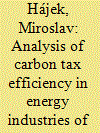

|
|
|
|
|
| Summary/Abstract |
A carbon tax is one of economic policy instruments of environmental protection supposed to contribute to the reduction of greenhouse gas (GHG) emissions. A functional carbon tax aims at incorporating costs for elimination of environmental harm into the pricing decisions. In terms of global climate change, the carbon tax is usually imposed on the production, distribution or consumption of carbon-content fossil fuels. The main aim of the study is to evaluate the carbon tax environmental effectiveness in the energy industries of selected EU countries, namely Sweden, Finland, Denmark, Ireland and Slovenia. To achieve the principal research objective, the multiple panel regression method for the selected variables was used, the synergy of other environmental policy tools being taken into account. Control variables employed were emission allowance price, household final consumption expenditure, corporate investments, solid fuel consumption and renewable energy consumption. The analysis results suggest that the carbon tax in the energy industry is environmentally efficient, an increased tax rate allowing to reduce GHG production, which is statistically significantly affected by the consumption of fossil fuels. Based on the estimated partial regression coefficient (−0.01158), raising the carbon tax by one euro per tonne can cut annual per capita emissions by 11.58 kg.
|
|
|
|
|
|
|
|
|
|
|
|
|
|
|
|
| 2 |
ID:
183175
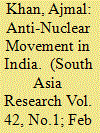

|
|
|
|
|
| Summary/Abstract |
This article discusses two prominent protest movements in India responding to nuclear energy expansion, protests related to the Kudankulam Nuclear Power Project in Tamil Nadu and the Jaitapur Nuclear Power Project in Maharashtra. Partly based on ethnographic fieldwork at both sites, the article argues that these protest movements are substantially different from anti-nuclear mobilisations outside South Asia. Indian nuclear-related protest movements problematise the tensions of development and environment from a grassroots perspective but struggle with opposing claims that more energy is needed. Locally, project-affected people do not trust government agencies to protect them and the local environment against creeping pollutions and potential disasters. Above all, local grievances are directed against high-handed procedures of compensating project-affected persons. Seen from this angle, these protest movements are in effect contributing to the arduous process of democratisation of governance regarding the constantly changing modalities of expanding energy provisions in India.
|
|
|
|
|
|
|
|
|
|
|
|
|
|
|
|
| 3 |
ID:
103266


|
|
|
|
|
| Publication |
2011.
|
| Summary/Abstract |
The demand for energy in Bangladesh and India have been increasing due to rapid urbanization, industrialization, rising incomes, and growing use of energy-intensive products. Bangladesh faces extraordinary challenges in the energy sector. It has substantial economically recoverable natural gas reserves. But its energy mix is highly dependent on gas. The government of Bangladesh has prepared a proposal to set up a nuclear power plant and has decided to install wind-based independent power plants in offshore areas. On the other hand, India also faces a formidable challenge in meeting its energy needs and providing adequate and affordable energy to all sections of society in a sustainable manner. India's energy concerns established a new dynamism when the Indian government decided to explore and execute transportation of natural gas through proposed pipelines such as Iran-Pakistan-India pipeline project, Turkmenistan-Afghanistan-Pakistan-India pipeline project and Myanmar-Bangladesh-India pipeline project. But the proposed Myanmar-Bangladesh-India pipeline project was withheld during the period of 2001-2006 due to political mismatch between Bangladesh and India. However, there are several other scopes which can be explored in terms of energy security cooperation on bilateral and multilateral basis. The Prime Minister of Bangladesh, Sheikh Hasina and the Prime Minister of India, Dr. Manmohan Singh agreed in a joint communiqué in New Delhi on 13 January 2010 to put in place a comprehensive framework of cooperation for development between the two countries, encapsulating their mutually shared vision for the future, which includes cooperation in energy, among others.
|
|
|
|
|
|
|
|
|
|
|
|
|
|
|
|
| 4 |
ID:
177499


|
|
|
|
|
| Summary/Abstract |
This study provides empirical evidence on the association between board attributes and corporate social responsibility (CSR) engagement—as well as between CSR engagement and corporate performance—in the global energy sector. The data for the period of 2011–2018 was obtained from Thomson Reuters. The results indicate that board diligence and CSR committees are robust drivers of CSR performance, as proxied by the composite environmental, social, and governance (ESG) score along with its three individual indicators. While board independence is more influential in boosting the aggregate ESG score and the governance indicator, the board's gender diversity is more influential in environmental and governance indicators. However, higher CSR performance does not guarantee higher financial performance—as proxied by both market and accounting performance. We provide theoretical and practical implications, to guide regulators and energy firms in ensuring the sustainable development of the sector.
|
|
|
|
|
|
|
|
|
|
|
|
|
|
|
|
| 5 |
ID:
086722
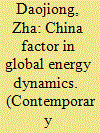

|
|
|
|
|
| Publication |
2009.
|
| Summary/Abstract |
The China factor is arguably the most important element in the anxieties of the past decade over energy and energy induced geopolitical changes around the world. It is, however, highly difficult of this issue, prevalent though they are in the mass media, diplomats venues, and even academic circles.
|
|
|
|
|
|
|
|
|
|
|
|
|
|
|
|
| 6 |
ID:
127574


|
|
|
|
|
| Publication |
2012.
|
| Summary/Abstract |
When the fourth generation of leaders came to power in China, the country began drawing up its policy in Central Asia (CA) on the concept of peripheral diplomacy, which since 2005 has been based not on the thesis of "China's peaceful rise," but on the theory of "peaceful development" that came to replace it, as well as on the idea proposed by Hu Jintao of "working together to build a harmonious world." At present, China's relations with the regional states are being established in keeping with the concept of "friendly, peaceful, and prosperous neighbors" (mulin, anlin, fulin) confirmed at the 17th congress of the CPC. As Fudan University Professor Zhao Huasheng, a leading Chinese specialist on CA, emphasized, this concept, which was formulated as early as 2003, reflects the new approaches to relations with neighboring countries.
|
|
|
|
|
|
|
|
|
|
|
|
|
|
|
|
| 7 |
ID:
115169


|
|
|
|
|
| Publication |
2012.
|
| Summary/Abstract |
This paper analyzes consumer satisfaction in the energy sector in Kenya to assess the quality and level of service delivery. By use of the European Consumer Satisfaction Index (ECSI), the paper estimates consumer satisfaction in biomass, petroleum, electricity and renewable energy subsectors. The findings are that consumer satisfaction is highest in the renewable energy sub sector at 74.7% followed by petroleum at 62.8%. The electricity sub sector has the lowest consumer satisfaction of 53.06%. Further, it is found that the image of renewable energy providers is also the highest at 72.5% followed by that of petroleum companies at 63.1%. In the electricity sub sector, perceived value scored the highest at 64.2%. The paper concludes that image of a service provider, loyalty of consumers, consumer expectations, perceived value, perceived quality and the way complains are handled are very important factors that determine consumer satisfaction levels. It is recommended that for monitoring and evaluation purposes in the performance of the energy sector, the Energy RegulatoryCommission(ERC) could use the consumer satisfaction index level to evaluate whether the regulatory policies and their implementation are bearing fruit where a high index would be associated with good performance and vice versa.
|
|
|
|
|
|
|
|
|
|
|
|
|
|
|
|
| 8 |
ID:
177370
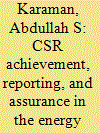

|
|
|
|
|
| Summary/Abstract |
Drawing on signaling theory and the greenwashing tendency, the objective of this study is to explore the connection among four facets of corporate social responsibility (CSR) practice: CSR performance, CSR reporting, following the Global Reporting Initiative (GRI) guidelines in preparing CSR reports, and verifying the reliability of CSR reports through an external assurance statement. The sample of the study includes 2244 firm-year observations of energy firms listed in the Thomson Reuters Eikon database for the period 2012–2018. Panel data analysis with fixed effects is used as the empirical methodology. The findings lend support to signaling theory and reject a greenwashing tendency in the energy sector with the validation of hypothesized relationships. More specifically, higher CSR performers show their CSR commitment by issuing CSR reports as well as by adopting GRI guidelines in their CSR reports and verifying the reliability of the contents of their reports through an external assurance statement. Moreover, GRI framework adopters are more likely to obtain external assurance of their reports. The examination of these relationships considering the economic development levels of countries highlights notable differences: all hypothesized connections are stronger for firms established in middle-income countries than for those in high-income countries except for one dimension.
|
|
|
|
|
|
|
|
|
|
|
|
|
|
|
|
| 9 |
ID:
092810


|
|
|
|
|
| Publication |
2009.
|
| Summary/Abstract |
Vertical unbundling in the electricity sector is a hot political topic in the European Union. The European Commission has decided that the ownership unbundling of transmission networks from other stages in the value chain is the most effective way to ensure fair network access and infrastructure investment. While this European unbundling debate has not ended yet and most countries still do not have an independent transmission system operator (TSO), the Dutch government has already taken one step further. In 2008, it decided that distribution companies should be completely separated from commercial activities that are part of the same holding (generation, trade and supply). This governmental decision has been fiercely debated. Although the goal is to improve competition as well as security of supply, these benefits are uncertain. Nevertheless, it is certain that ownership unbundling comes at a cost. In this paper we present an ex ante cost-benefit analysis of the Dutch unbundling act. We conclude that it is unlikely that this act is welfare enhancing: divorce comes at a price.
|
|
|
|
|
|
|
|
|
|
|
|
|
|
|
|
| 10 |
ID:
108191
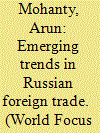

|
|
|
| 11 |
ID:
138380
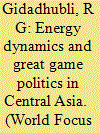

|
|
|
|
|
| Summary/Abstract |
Post-Soviet CA has become a victim of Great Game politics during the last two decades. Potentialities of energy sector CA has increased with Western investment, technology and market that brought dividends with huge inflow of petrodollars to Kazakhstan and Turkmenistan. But fluctuations of both in international prices for oil and gas and in global demand for energy have made a direct impact on economies of CA countries. Energy sector of CA is exposed to pipeline politics. There is realization of negative consequences of overdependence on energy sector. Lack of intra-regional cooperation has adversely affected Kyrgyzstan and Tajikistan
|
|
|
|
|
|
|
|
|
|
|
|
|
|
|
|
| 12 |
ID:
099980
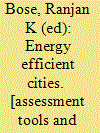

|
|
|
|
|
| Publication |
Washington, DC, World Bank, 2009.
|
| Description |
xviii, 227p.
|
| Standard Number |
9780821381045
|
|
|
|
|
|
|
|
|
|
|
|
Copies: C:1/I:0,R:0,Q:0
Circulation
| Accession# | Call# | Current Location | Status | Policy | Location |
| 055456 | 333.7916091732/BOS 055456 | Main | On Shelf | General | |
|
|
|
|
| 13 |
ID:
169755
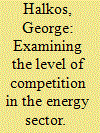

|
|
|
|
|
| Summary/Abstract |
During the recent decades, the energy sector has undergone thoughtful structural changes, getting towards a more competitive environment, a process that is highly controlled and monitored by regulatory authorities. The differences in the pace and extent of market reforms are mainly related to the starting point of each reform and the problems associated with the internal environment of the market. The applied theoretical and analytical contributions provide guidance to policy-makers and government officials in designing new policy scenarios for the investigation of the role of competition in the energy sector. The empirical contributions provide evidence to support and inform current policy debates and should be of benefit to policy-makers and researchers worldwide.
|
|
|
|
|
|
|
|
|
|
|
|
|
|
|
|
| 14 |
ID:
175013
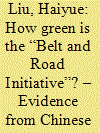

|
|
|
|
|
| Summary/Abstract |
From an analysis of 729 completed energy sector outward foreign direct investment (OFDI) deals by Chinese firms from 2005 to 2016, this paper evaluated the Chinese OFDI greening tendencies and the links to host country energy structures and energy efficiency, for which PSM-DID analysis was used to control the influence of endogeneity resulting from missing variables. It was found that Chinese firms tended to invest in green projects when the host countries had better political environments, natural resource endowments and higher energy efficiencies, but lower carbon dioxide intensities, less developed energy structures, technologies and infrastructures. It was also found that the Belt and Road Initiative (BRI) had a strong policy effect on the greening of Chinese OFDI in the related countries and areas and especially in developing countries. Because the Chinese firms chose to invest in clean energy projects as a result of the new BRI policy framework, this research shed light on the Chinese OFDI policy responses.
|
|
|
|
|
|
|
|
|
|
|
|
|
|
|
|
| 15 |
ID:
171500


|
|
|
|
|
| Summary/Abstract |
The energy sector transition requires large financial investments in low-carbon generation technologies, to be delivered by a variety of actors with heterogeneous characteristics. Real-world actors have bounded-rationality, reflected by their limited foresight and heterogeneous expectations, and as past trends influence their investments. Agent-based models are highly suitable modelling frameworks to study such realistic and complex energy transition dynamics. This paper introduces BRAIN-Energy, a novel agent-based model which explicitly allows to explore the impacts of actors' heterogeneous characteristics, and of their interactions, on the transition pathways of the UK, German and Italian electricity sectors. Results show that actors' heterogeneous characteristics pose barriers to effective decarbonisation efforts, affect the speed of the transition, and impact the transition's security of supply and affordability dimensions. Limited foresight and path-dependency lead to investment cycles (both virtuous and vicious). The country comparison highlights how such effects are stronger in markets with more heterogeneous market players.
|
|
|
|
|
|
|
|
|
|
|
|
|
|
|
|
| 16 |
ID:
167027
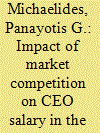

|
|
|
|
|
| Summary/Abstract |
In this work, we examine the impact of market competition on CEOs' salaries by analyzing a sample of allS&P American firms in the energy sector, in the 1992–2015 time-span, and measuring market competition by means of the so-called Herfindhal-Hirschman-Index. We divide industries into three sub-groups based on small, medium and high market concentration and try to expand our research by exploring the impact of the recent financial crisis. The paper investigates how CEOs' salaries are affected by firm-level determinants, e.g. firm size, returns on assets, returns on equity, capital expenditure, market concentration, Tobin's Q etc, as well as by the individual characteristics of each CEO, e.g. CEOs age, gender. Based on our findings, the market concentration index in the US energy sector has a negative and statistically significant impact on CEO salary for all firms that operate in either a highly monopolistic or a purely competitive environment. The results of this empirical work are robust after examining for different alternative high order fixed effects specifications.
|
|
|
|
|
|
|
|
|
|
|
|
|
|
|
|
| 17 |
ID:
159699


|
|
|
|
|
| Publication |
New Delhi, Wisdom Tree, 2017.
|
| Description |
xi, 211p.hbk
|
| Standard Number |
9788183284981
|
|
|
|
|
|
|
|
|
|
|
|
Copies: C:1/I:0,R:0,Q:0
Circulation
| Accession# | Call# | Current Location | Status | Policy | Location |
| 059412 | 320.954/DEB 059412 | Main | On Shelf | General | |
|
|
|
|
| 18 |
ID:
187787
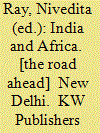

|
|
|
|
|
| Publication |
New Delhi, KW Publishers Pvt Ltd, 2021.
|
| Description |
xxix, 190p.hbk
|
| Series |
Sapru House Soundings on Area Studies
|
| Standard Number |
9789383445530
|
|
|
|
|
|
|
|
|
|
|
|
Copies: C:1/I:0,R:0,Q:0
Circulation
| Accession# | Call# | Current Location | Status | Policy | Location |
| 060253 | 327.5406/RAY 060253 | Main | On Shelf | General | |
|
|
|
|
| 19 |
ID:
169431
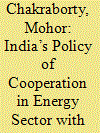

|
|
|
|
|
| Summary/Abstract |
Since the National Democratic Alliance (NDA-II) government assumed its position at the helm of affairs in May 2014, the graph of Indo-Vietnam relations has experienced significant milestones, unveiling opportunities for greater and extensive cooperation in a host of areas. Vietnam’s steady ascent to a position of priority within the wider ambit of the ‘Act East’ Policy, envisaging sincere and constructive engagement, has been premised on the 3C ‘mantra’ of ‘Commerce, Culture and Connectivity’.
|
|
|
|
|
|
|
|
|
|
|
|
|
|
|
|
| 20 |
ID:
125229
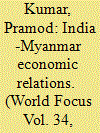

|
|
|
|
|
| Publication |
2013.
|
| Summary/Abstract |
To make India's 'Look East Policy' more effective and fruitful, engagement with Myanmar becomes vital, as its location is such that it can prove to be a bridge between India and the ASEAN. Though India-Myanmar relationship dates back to the era of great Indian king Asoka but due to the weaker kings in the subsequent centuries, we find the invisibility of relationship between the two countries. In recent years both the countries have realized the urgency of a close and operative relationship and thus they are putting every effort to take it forward to new heights. India is engaged in Myanmar in many ways whether it is humanitarian aid and assistance or the development of infrastructural project or industries or in providing training to IT professionals etc. Apart from this, India is providing aid to Myanmar for different purposes. Myanmar has allowed Indian firms to engage in energy sector such as natural oil and gas and also in the field of hydropower. It is extremely important for India as India is an energy-scarce country and to have energy security, India has to look beyond the west Asian countries and thus, Myanmar becomes vital.
|
|
|
|
|
|
|
|
|
|
|
|
|
|
|
|
|
|
|
|
|